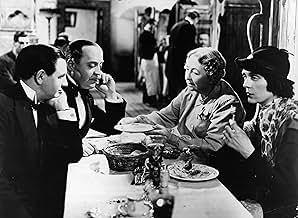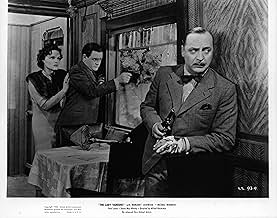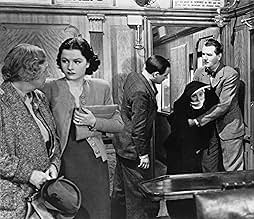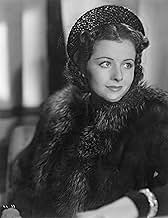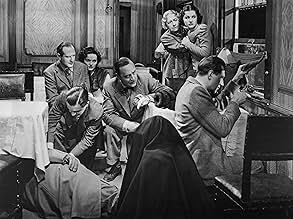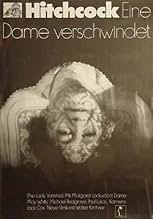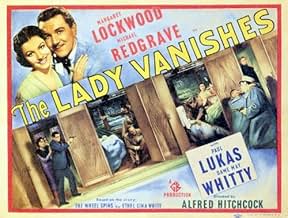VALUTAZIONE IMDb
7,7/10
60.058
LA TUA VALUTAZIONE
Mentre viaggia attraverso l'Europa continentale, una ragazza ricca di alto borgo si accorge che una signora anziana sembra essere scomparsa dal treno.Mentre viaggia attraverso l'Europa continentale, una ragazza ricca di alto borgo si accorge che una signora anziana sembra essere scomparsa dal treno.Mentre viaggia attraverso l'Europa continentale, una ragazza ricca di alto borgo si accorge che una signora anziana sembra essere scomparsa dal treno.
- Regia
- Sceneggiatura
- Star
- Premi
- 1 vittoria e 1 candidatura in totale
May Whitty
- Miss Froy
- (as Dame May Whitty)
Selma Vaz Dias
- Signora Doppo
- (as Zelma Vas Dias)
Catherine Lacey
- The Nun
- (as Catherine Lacy)
Recensioni in evidenza
The Lady Vanishes (1938)
A Hitchcock movie filled with mystery but lacking suspense. Which is quite fine, turning "The Lady Vanishes" into a fun movie with lots of wry jokes and clever twists. You can't take it any more seriously than Hitchcock did, and he famously had fun with his ideas. That's one reason why they are recognizably Hitch.
This is a transitional movie for the director in many ways. For one thing it was hugely successful in Britain, and then later in the U.S., and Hitchcock soon moved to Hollywood where his stellar string of successes for over 20 years began. But that said, this is a film filled with provincial humor (that was a joke, in case you are British)--that is, you need to have a feel for British humor, and for the style of joking and making witty remarks (constantly) of the time. It's a hilarious movie. When you aren't laughing you're still tickled.
Which is what disappoints some viewers expecting "Psycho" or something. Nope. But you'll recognize the director's hand here, mixing regular people who are misunderstood (if not quite accused of something they didn't do) and who end up having to solve the problem themselves. And so it goes, and they do rather well for a couple of ordinary folk.
When I say there is no suspense I mean it, even when there is uncertainty. The biggest twist of the whole plot (not to be mentioned here!) is only kept from the viewer for a short while. Then the actors tell you! Yes, you are let in on the secret, and yet the movie goes on from there. That is--it's not about worrying and trying to figure it out. It's about watching the main characters work together and piece together their way out of a sticky situation. And of course eventually fall in love.
You forget sometimes that the key element in nearly every Hitchcock movie is a love story. After all, that's what matters to most of us (or all of us?) day after day, so he zeroes in on that even as the world is threatened by uranium 235 ("Notorious"), a murderer in the apartment complex ("Rear Window"), the ghost of a previous wife ("Rebecca") and so on. (Of these, "Psycho" is an interesting exception.) So watch what is actually a romantic comedy with a dash of international intrigue in the ominous year leading up to WWII, which hasn't happened at the time of filming. Great stuff.
A Hitchcock movie filled with mystery but lacking suspense. Which is quite fine, turning "The Lady Vanishes" into a fun movie with lots of wry jokes and clever twists. You can't take it any more seriously than Hitchcock did, and he famously had fun with his ideas. That's one reason why they are recognizably Hitch.
This is a transitional movie for the director in many ways. For one thing it was hugely successful in Britain, and then later in the U.S., and Hitchcock soon moved to Hollywood where his stellar string of successes for over 20 years began. But that said, this is a film filled with provincial humor (that was a joke, in case you are British)--that is, you need to have a feel for British humor, and for the style of joking and making witty remarks (constantly) of the time. It's a hilarious movie. When you aren't laughing you're still tickled.
Which is what disappoints some viewers expecting "Psycho" or something. Nope. But you'll recognize the director's hand here, mixing regular people who are misunderstood (if not quite accused of something they didn't do) and who end up having to solve the problem themselves. And so it goes, and they do rather well for a couple of ordinary folk.
When I say there is no suspense I mean it, even when there is uncertainty. The biggest twist of the whole plot (not to be mentioned here!) is only kept from the viewer for a short while. Then the actors tell you! Yes, you are let in on the secret, and yet the movie goes on from there. That is--it's not about worrying and trying to figure it out. It's about watching the main characters work together and piece together their way out of a sticky situation. And of course eventually fall in love.
You forget sometimes that the key element in nearly every Hitchcock movie is a love story. After all, that's what matters to most of us (or all of us?) day after day, so he zeroes in on that even as the world is threatened by uranium 235 ("Notorious"), a murderer in the apartment complex ("Rear Window"), the ghost of a previous wife ("Rebecca") and so on. (Of these, "Psycho" is an interesting exception.) So watch what is actually a romantic comedy with a dash of international intrigue in the ominous year leading up to WWII, which hasn't happened at the time of filming. Great stuff.
For what turned out to be his last masterpiece in the United Kingdom before leaving for Hollywood, Alfred Hitchcock went back to a familiar theme of someone being innocently caught up in intrigue.
The someone here is the beautiful Margaret Lockwood who is being gaslighted while on a train in Eastern Europe. She's made the acquaintance of Dame May Witty who disappears from the moving train and no one but Lockwood remembers she even exists.
Lockwood gains a sympathetic if skeptical ally in Michael Redgrave and they search the train for Witty. Of course as it is in Hitchcock films, the train's passengers and crew are not all they seem to be either and in the end the passengers have to fight for their lives.
Although Lockwood is a striking dark beauty, not the cool blondes that Hitchcock normally favored, she's a fine Hitchcock heroine. Best in the supporting cast are Naunton Wayne and Basil Radford who seem like a pair of silly English twits whose only concern is getting back for a big cricket match. They actually come through when the chips are down.
Viewers should also take note of Cecil Parker who plays a barrister on holiday with his mistress whose main concern is staying uninvolved lest news of a scandal kill a judicial appointment he wants. He is one absolute horse's patoot and his death must have been cheered by film audiences in the theaters.
Alfred Hitchcock was about to leave his homeland and the less expensive British film industry for Hollywood and bigger budgets. The Lady Vanishes however is a great example of what can be done even on a skimpy budget by a master craftsman.
The someone here is the beautiful Margaret Lockwood who is being gaslighted while on a train in Eastern Europe. She's made the acquaintance of Dame May Witty who disappears from the moving train and no one but Lockwood remembers she even exists.
Lockwood gains a sympathetic if skeptical ally in Michael Redgrave and they search the train for Witty. Of course as it is in Hitchcock films, the train's passengers and crew are not all they seem to be either and in the end the passengers have to fight for their lives.
Although Lockwood is a striking dark beauty, not the cool blondes that Hitchcock normally favored, she's a fine Hitchcock heroine. Best in the supporting cast are Naunton Wayne and Basil Radford who seem like a pair of silly English twits whose only concern is getting back for a big cricket match. They actually come through when the chips are down.
Viewers should also take note of Cecil Parker who plays a barrister on holiday with his mistress whose main concern is staying uninvolved lest news of a scandal kill a judicial appointment he wants. He is one absolute horse's patoot and his death must have been cheered by film audiences in the theaters.
Alfred Hitchcock was about to leave his homeland and the less expensive British film industry for Hollywood and bigger budgets. The Lady Vanishes however is a great example of what can be done even on a skimpy budget by a master craftsman.
"The Lady Vanishes" is one of Director Alfred Hitchcock's best British made films, in fact I think it's one of his all time best.
Set in pre-WWII somewhere in Europe, A group of people board a train bound for England after having spent the previous night in an overcrowded hotel. Iris Henderson (Margaret Lockwood) befriends a kindly old governess/teacher, Miss Froy (Dame May Witty). When Iris is struck by a falling flowerpot, Miss Froy promises to take care of her as they board the train.
After having tea together, the two women return to their compartment where Iris falls asleep. When she awakes, Miss Froy is gone, totally vanished. The people sharing the compartment, "The Baroness" (Mary Clare), Signor and Signora Doppo (Philip Leaver, Selma Van Dias) deny ever having seen Miss Froy. Doctor Hartz (Paul Lukas) comes to her aid and is convinced that the bump Iris received to her head may have caused a memory lapse.
Iris then meets Gilbert Redman (Michael Redgrave) whom she had met the previous evening at the hotel. He offers his help. Skeptical at first, he soon comes to believe Iris' story. Eric Todhunter (Cecil Parker) and "Mrs." Todhunter (Linden Travers) deny seeing Miss Froy because they are in the midst of an extra marital affair. Two British "gentlemen", Caldicott (Naughton Wayne) and Charters (Basil Radford) though having seen Miss Froy with Iris, don't wish to become involved.
When Dr. Hartz brings a patient aboard the train, Gilbert and Iris become suspicious and.......................................
As was his custom, Hitchcock pits his heroine against all odds in her quest to find Miss Froy. The suspense builds as the situation becomes more hopeless. This would be a theme that the master of suspense would use throughout his career. He also liked to work trains into many of his plots, including this film of which three quarters takes place on board a train.
The scene in the hotel showing Caldicott and Charters sharing a bed (and a pair of pajamas) never would have gotten by the American censors. The relationship between the Todhunters as well, was quite obvious and rare for the American cinema of the day.
This is one of Hitchcock's best films and hasn't suffered because of age. Highly recommended.
Set in pre-WWII somewhere in Europe, A group of people board a train bound for England after having spent the previous night in an overcrowded hotel. Iris Henderson (Margaret Lockwood) befriends a kindly old governess/teacher, Miss Froy (Dame May Witty). When Iris is struck by a falling flowerpot, Miss Froy promises to take care of her as they board the train.
After having tea together, the two women return to their compartment where Iris falls asleep. When she awakes, Miss Froy is gone, totally vanished. The people sharing the compartment, "The Baroness" (Mary Clare), Signor and Signora Doppo (Philip Leaver, Selma Van Dias) deny ever having seen Miss Froy. Doctor Hartz (Paul Lukas) comes to her aid and is convinced that the bump Iris received to her head may have caused a memory lapse.
Iris then meets Gilbert Redman (Michael Redgrave) whom she had met the previous evening at the hotel. He offers his help. Skeptical at first, he soon comes to believe Iris' story. Eric Todhunter (Cecil Parker) and "Mrs." Todhunter (Linden Travers) deny seeing Miss Froy because they are in the midst of an extra marital affair. Two British "gentlemen", Caldicott (Naughton Wayne) and Charters (Basil Radford) though having seen Miss Froy with Iris, don't wish to become involved.
When Dr. Hartz brings a patient aboard the train, Gilbert and Iris become suspicious and.......................................
As was his custom, Hitchcock pits his heroine against all odds in her quest to find Miss Froy. The suspense builds as the situation becomes more hopeless. This would be a theme that the master of suspense would use throughout his career. He also liked to work trains into many of his plots, including this film of which three quarters takes place on board a train.
The scene in the hotel showing Caldicott and Charters sharing a bed (and a pair of pajamas) never would have gotten by the American censors. The relationship between the Todhunters as well, was quite obvious and rare for the American cinema of the day.
This is one of Hitchcock's best films and hasn't suffered because of age. Highly recommended.
"Well, anyway, I refuse to be discouraged. Faint heart never found old lady."
Ah, this was a great movie! One of Hitch's best, and certainly one of his most entertaining. It was funny, thrilling, and just plain old fun to watch.
The story is quite simple. A sweet old lady disappears on a train, and the only person who admits ever seeing her, is a young woman who met her the night before. As she searches for the old lady, she's helped by a roguish young man, and they soon begin to wonder just who this lady is, where she went, and why on earth would so many people go through so much trouble to make it seem like she never existed. It all makes for a very compelling mystery.
The Lady Vanishes features some of the best characters I've ever seen in a Hitchcock film. Margaret Lockwood and Michael Redgrave were great as the two main protagonists, and the witty banter between the two was equaled only by the two dry, cricket-obsessed Englishmen who provided so much of the humor of the film. I found this movie to be similar to Rear Window (no wonder I enjoyed it so much), as there are many subplots among the minor characters that are almost as interesting as the main story.
I firmly believe that this is the best I've seen of Hitchcock's early movies. It has everything from shootouts to nuns in high heels. The Lady Vanishes will convert you to being a fan of Alfred, if you're somehow (drugs?) not already.
Ah, this was a great movie! One of Hitch's best, and certainly one of his most entertaining. It was funny, thrilling, and just plain old fun to watch.
The story is quite simple. A sweet old lady disappears on a train, and the only person who admits ever seeing her, is a young woman who met her the night before. As she searches for the old lady, she's helped by a roguish young man, and they soon begin to wonder just who this lady is, where she went, and why on earth would so many people go through so much trouble to make it seem like she never existed. It all makes for a very compelling mystery.
The Lady Vanishes features some of the best characters I've ever seen in a Hitchcock film. Margaret Lockwood and Michael Redgrave were great as the two main protagonists, and the witty banter between the two was equaled only by the two dry, cricket-obsessed Englishmen who provided so much of the humor of the film. I found this movie to be similar to Rear Window (no wonder I enjoyed it so much), as there are many subplots among the minor characters that are almost as interesting as the main story.
I firmly believe that this is the best I've seen of Hitchcock's early movies. It has everything from shootouts to nuns in high heels. The Lady Vanishes will convert you to being a fan of Alfred, if you're somehow (drugs?) not already.
Dame Mae Witty gives a memorable performance as the old woman who goes missing. The rest of the cast is great with Margaret Lockwood as the woman she befriends on the train. Sir Michael Redgrave also is wonderful as the obvious love interest of Lockwood. The film is truly filled with Hitchcock's stamp all over it. He takes a simple story and makes us not only intriguing but entertaining as well. They remade the film again in 1978 more than 40 years after this film debuted in British cinema. This classic film should not be mixed up with that one. I enjoyed this film. It had its humorous moments. I think this film is really wonderful to watch without being too much. Nowadays filmmakers can take note by Hitchcock's genius and talent. You do not need grand special effects today to create a memorable film but great actors and decent writing. This film is a great film about a good old fashioned mystery without deterring the audience. This film is good old fashioned movie making at its best.
Lo sapevi?
- QuizIn order to get a realistic effect, Sir Alfred Hitchcock insisted that there should be no background music except at the beginning and the end. Between those two points, the only music heard is the music sung by the musician outside the hotel, the music tune of Miss Froy, the "Colonel Bogey March" music hummed by Gilbert (Michael Redgrave), the dance music conducted by Gilbert in his hotel room, and the dance music when Iris (Margaret Lockwood) meets Gilbert in the train.
- BlooperIn the noisy dancing scene above Lockwood's hotel room, the clarinet is shown with the mouthpiece turned with the reed upwards. Normally the mouthpiece is turned so that the reed is downwards, but in some European folk traditions the clarinet was played with the mouthpiece "upside-down".
- Citazioni
Gilbert: Can I help?
Iris Henderson: Only by going away.
Gilbert: No, no, no, no. My father always taught me, never desert a lady in trouble. He even carried that as far as marrying Mother.
- Curiosità sui creditiClosing credits: The Characters in "THE LADY VANISHES" were played by:
- Versioni alternativeA brief segment where a hotel maid bends down to pick up a hat from under a hotel bed is missing from most US releases, including Criterion's first official DVD and all bootlegs. It's intact in all official non-US releases and has been restored for Criterion's 2-disc remastered DVD.
- ConnessioniEdited from Oh, Mr. Porter! (1937)
I più visti
Accedi per valutare e creare un elenco di titoli salvati per ottenere consigli personalizzati
Dettagli
- Data di uscita
- Paese di origine
- Sito ufficiale
- Lingue
- Celebre anche come
- La dama desaparece
- Luoghi delle riprese
- Azienda produttrice
- Vedi altri crediti dell’azienda su IMDbPro
Botteghino
- Lordo in tutto il mondo
- 44.182 USD
- Tempo di esecuzione
- 1h 36min(96 min)
- Colore
- Proporzioni
- 1.37 : 1
Contribuisci a questa pagina
Suggerisci una modifica o aggiungi i contenuti mancanti


